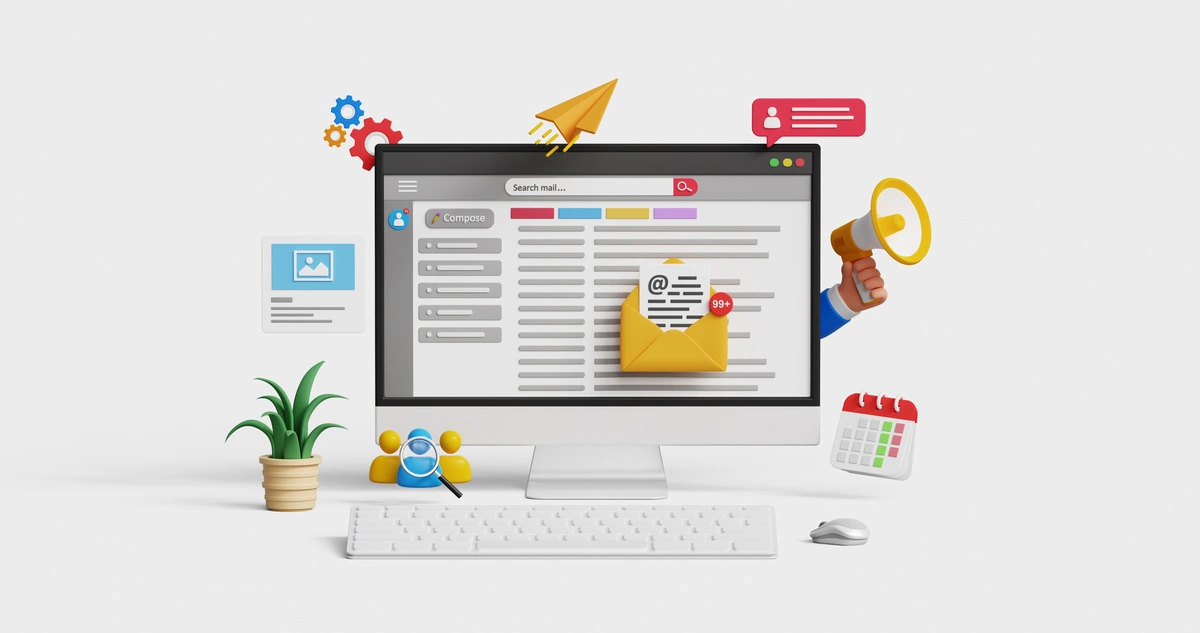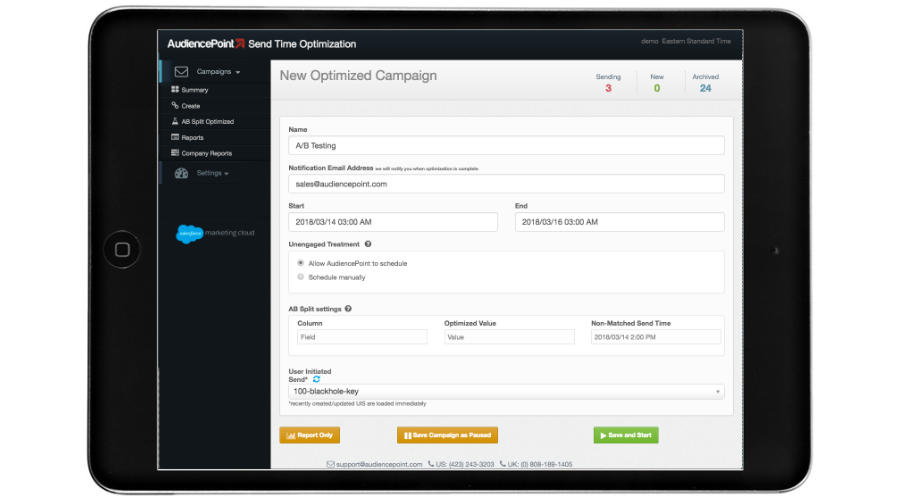AudiencePoint is thrilled to announce our new integration with Klaviyo! AudiencePoint is looking for partners to pilot our...
What Can Affect Email Deliverability?
Email deliverability is a multifaceted challenge faced by email marketers today. While crafting compelling messages is one thing, ensuring that they land in your subscribers’ inboxes is another. Several factors can significantly influence email deliverability, and addressing these can dramatically improve the performance of your email marketing campaigns and enhance inbox placement.
Foremost among these factors is the importance of the sender’s reputation. Your sender reputation is essentially a score that internet service providers (ISPs) assign to your domain. This score is influenced by various aspects, such as whether your emails are frequently marked as spam, how many emails bounce back, and if recipients frequently open, read, or engage with your messages. A poor sender reputation can mean that your emails might not even reach the inbox, being filtered out as spam before they’re ever seen by your intended audience.
Additionally, the role of engagement rates and user behavior cannot be overstated. ISPs often track user engagement metrics, such as open rates, click-through rates, and even how often users delete your emails without reading them. High engagement rates signal to ISPs that your content is relevant and welcome, thus boosting deliverability. Conversely, low engagement might result in your emails being classified as unwelcome or spam, reducing your reach and effectiveness.
Does Domain Affect Email?
The domain you use in your email address does, in fact, have a significant impact on email deliverability. This connection becomes especially apparent when discussing the role of domain factors in emails and how they determine whether your messages reach the recipient’s inbox.
Explanation of Domain Factors in Email Deliverability
Your email domain can influence how your emails are perceived by both service providers and recipients. Key domain factors that impact deliverability include domain credibility, history, and age. Domains with a chaotic spam history or questionable backgrounds may harm your email campaign’s performance. Conversely, well-managed domains can help in achieving better inbox placement.
Impact of Domain Credibility and Trustworthiness
Email service providers heavily factor in the credibility of your domain when determining whether to classify your emails as spam. Trust is built over time through consistent, respectful email practices, such as avoiding spam techniques and engaging responsibly with subscribers. A poor reputation can lead to emails being filtered out, making domain credibility vital for successful delivery.
How Domain Age and History Play a Role
The age and history of your domain also contribute to its reputation in email deliverability. Older domains with a clean history are generally perceived as more trustworthy, making their emails more likely to pass through spam filters. Establishing a credible domain from the onset and maintaining rigorous reputation management are best practices for ensuring email deliverability.
In summary, the domain you choose for your emails is more than a digital address; it’s a critical component of your deliverability strategy. Checking your domain’s email reputation through tools and aligning with reputed services like AudiencePoint’s ListFit can help ensure you’re building and upholding a solid domain reputation.
Does Domain Extension Affect Email Deliverability?
Differences Between Common and Niche Domain Extensions
In the realm of email deliverability, domain extensions play a more critical role than one might assume. While the core domain name largely bears the burden of reputation and trust, the choice between a common domain extension, like .com or .org, versus a niche extension, such as .store or .guru, can influence deliverability.
Common domain extensions are widely recognized and often perceived as more reliable due to their established presence on the internet. Email services are used to deal with these domains, which typically results in a more straightforward path to the inbox. On the flip side, niche domain extensions, although unique and trendy, might not be as recognized by email services, which can sometimes raise flags or result in a closer scrutiny of the emails sent from these domains.
Perception of Domain Extensions by Email Services
Email service providers often utilize algorithms that categorize domain extensions into tiers based on familiarity, historical spam reports, and overall legitimacy. A domain ending in .com might be given preferential treatment over a .online or .xyz, primarily because the older, well-documented extensions provide ISPs with more data to assess and trust over time.
Furthermore, when a new domain extension is introduced, email services may apply more stringent filters to emails from these domains until they have had sufficient time to establish their credibility. The key for email marketers using niche extensions is to steadily build a positive reputation through consistent, compliant, and valued communications.
Potential Risks with Certain Extensions
While there is no intrinsic flaw in using any specific domain extension, marketers must be aware of the potential risks. Extensions that, over time, accumulate higher-than-average spam rates—common in certain niche categories—can face automatic downgrades in trust scores by email services. This doesn’t mean avoiding these extensions at all costs, but it does mean adhering to best practices becomes even more critical.
To mitigate risks, it’s essential to conduct regular email domain reputation checks to ensure that changing perceptions of extensions don’t negatively impact email deliverability. Utilizing tools that check domain email reputation for free can be invaluable in monitoring and maintaining the trustworthiness of unique domain extensions.
What Is Domain Reputation in Email Deliverability?
Definition and Importance of Domain Reputation
Domain reputation is a critical factor in determining the deliverability of your emails. It acts as a measure of trust and credibility associated with your domain in the eyes of Internet Service Providers (ISPs) and mailbox providers. Just as sender reputation impacts whether emails make it to an inbox, domain reputation influences how your emails are perceived. A strong domain reputation signifies to ISPs that your domain sends legitimate emails, reducing the risk of emails being diverted to spam folders.
For email marketers and digital marketing professionals, understanding and managing domain reputation is essential. A solid reputation increases the likelihood that emails will land where intended, maximizing outreach efforts. Conversely, a poor reputation can severely restrict email reach, leading to wasted resources and missed opportunities.
Methods to Check and Monitor Domain Reputation
Regular monitoring of your domain reputation is crucial for maintaining email deliverability. Several services provide insights into your domain’s standing, offering a gauge of how ISPs and mailbox providers perceive your email activities. Tools like sender score platforms offer a comprehensive view of your domain’s track record, helping identify any issues that require attention.
In addition to dedicated tools, keeping track of engagement metrics, such as open rates and unsubscribe rates, can indicate shifts in domain reputation. A sudden drop in engagement could be a warning sign that your domain reputation is suffering.
Tips on Improving and Maintaining a Good Reputation
Improving and maintaining a strong domain reputation involves several best practices focused on both technical and content strategies. Implementing robust email authentication protocols like SPF, DKIM, and DMARC ensures that your emails are authenticated and less likely to be marked as spam.
Ensuring high levels of engagement with relevant content tailored to your audience helps maintain reputation integrity. Addressing subscriber complaints promptly and offering straightforward unsubscribe options also demonstrates responsible and respectful email practices.
To uphold your domain’s standing, consistency in sending practices is necessary. Avoiding erratic email deployment patterns increases trust with ISPs and mailbox providers, bolstering reputation over time.
By constantly optimizing these facets of your email strategy, you can keep your domain reputation in exemplary condition, paving the way for successful email campaigns.
Gain a deeper understanding of how your domain reputation impacts email deliverability by partnering with AudiencePoint. Leverage our cutting-edge platform to refine your strategies, foster better engagement, and drive meaningful results. Elevate your email marketing campaigns with our insights, improving your reach and success rates in an increasingly competitive landscape.





